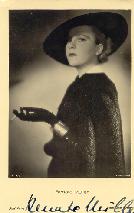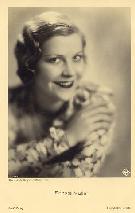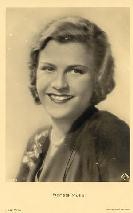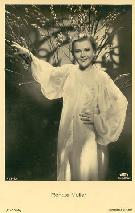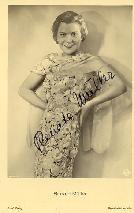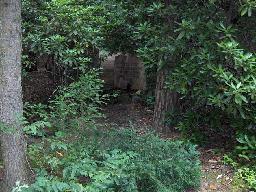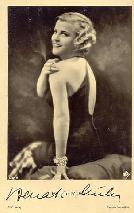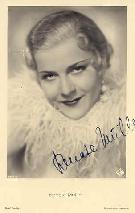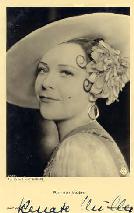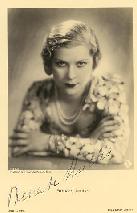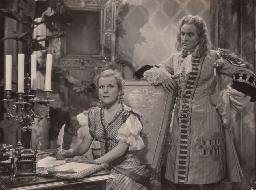Müller, Renate |
| ACTOR (GERMANY) |
|
BORN 26 Apr 1907, München, Bayern - DIED 7 Oct 1937, Berlin: Augsburg-Sanatorium CAUSE OF DEATH stroke? GRAVE LOCATION Berlin: Parkfriedhof Lichterfelde, Thuner Platz 2-4 (FiW 107) |
|
Renate Müller was the daughter of Dr. Karl Eugen Müller (1877-1951), art historian and editor of the Münchener Neueste Nachrichten. Her mother Anna Marie (Mariquita) Frederich (1881-1963) came from Chile and was a painter. She grew up in Emmering and the family moved to Danzig in 1914, where she took singing lessons with a Ms Biercelly against the wishes of her parents. In 1924 the family moved to Berlin where her father accepted a job with the Berliner Tageblatt. She continued her singing lessons under Zawilewsky and under Alfred Strauss. She left the gymnasium without graduating and took acting lessons with Lothar Müthel at the school of Max Reinhardt. G.W. Pabst was also among her teachers. In 1924 she was engaged at the Harzer Bergtheater in Thale, where Pabst worked as a director. She debuted there as Helene in "Sommernachtstraum". In 1926 she played at the Lessing theatre. In 1928 Reinhold Schünzel took her to the movies. In "Liebe im Ring" ("Love in the Ring") she played Max Schmeling's bride. The replacement of silent movies with sound movies was to her advantage. Her song "Ich bin ja heut' so glücklich" from "Die Privatsekretärin" (1931) was a hit and she also appeared in the English version "Sunshine Susie". She also starred in "Viktor und Viktoria" (1933). After the nazis came to power they regarded her as a perfect Arian woman and attempts were made to couple her to Hitler. After they failed Goebbels put her under permanent observation of the Gestapo, possibly because she knew things about Hitler. The nazis forced her to accept a part in the propaganda film "Togger" (1937). The different versions of how she met her end are confusing, but she seems to have been near to a nervous breakdown due to the pestering of the nazis. The Gestapo seemed to have found out that she had had a relation with a Jewist emigrant and that she visited him on London. The person in question was Georg Deutsch, the son of a banker who had left for Paris. Her friend Sybilla Schitz was said to have stated that she found her unconscious on her terrace after she had fallen drunk from her the first floor of her villa in Berlin-Dahlem. She didn't recover and she died in a sanatorium in Berlin. There were rumours that she was so desparate that she committed suicide. The rumours that she was heavily on drugs were probably spread by the nazis, to prevent the public from thinking that Goebbels and the Gestapo had driven the very popular actress to her death. But Goebbels noted on 8 October in his diary that he was very sorry for her. Her sister Gabriele always stated that Renate had died from post-operative complications. She was cremated at Krematorium Berlin-Wilmersdorf on 12 October and her ashes were buried at the Parkfriedhof Lichterfelde. Her posessions were confiscated and sold although her parents and her sister Gaberiele Schwarz were alive. They were all buried in the same grave in later years. The movie "Liebling der Götter" (1960) was based on her story, with Ruth Leuwerik playing Renate. The movie deviated from the facts and the Müller family tried to stop the project in vain, although some changes were agreed upon. At the time their attorney claimed that Renate had died from a stroke. Related persons • knew Harbou, Thea von • was pupil of Pabst, George Wilhelm • was a friend of Schmitz, Sybille • cooperated with Thimig, Hermann • cooperated with Walbrook, Anton |
Sources • Klöckner-Draga, Uwe, Renate Müller - Ihr Leben ein Drahtseilakt, Ein deutscher Filmstar, der keinen Juden lieben durfte, Kern, 2006 • Romani, Cinzia, Die Filmdiva des Dritte Reiches, Bahia, München, 1982 • filmportal.de - Alles zum deutschen Film • DER SPIEGEL - Fehler 404 |
